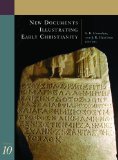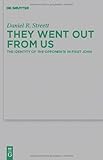 Eerdmans has just released the 10th volume in its NDIEC series. That stands for New Documents Illustrating Early Christianity. The editors of this series comb through all the published inscriptions and papyri and select the ones they think are most relevant to the study of early Christianity. This series provides a description and transcription of each Greek text, a translation, and a commentary on the text, with a focus on its relevance for the NT/Early Christianity. These volumes are very user-friendly and provide a lot of texts that make great practice for reading authentic Greek. But, a warning to users of the Erasmian pronunciation: you’ll have a hard time dealing with the spelling in these texts–very itacistic/phonetic. I’m not sure how you could read these texts without being convinced that a more-or-less modern pronunciation was already in effect in the early centuries CE.
Eerdmans has just released the 10th volume in its NDIEC series. That stands for New Documents Illustrating Early Christianity. The editors of this series comb through all the published inscriptions and papyri and select the ones they think are most relevant to the study of early Christianity. This series provides a description and transcription of each Greek text, a translation, and a commentary on the text, with a focus on its relevance for the NT/Early Christianity. These volumes are very user-friendly and provide a lot of texts that make great practice for reading authentic Greek. But, a warning to users of the Erasmian pronunciation: you’ll have a hard time dealing with the spelling in these texts–very itacistic/phonetic. I’m not sure how you could read these texts without being convinced that a more-or-less modern pronunciation was already in effect in the early centuries CE.
The volume retails for $40, but Amazon has it for $24 right now. Check out the preview at Google books.
Here’s the description from the publisher:
Each year many new Greek inscriptions and papyri are published. Others are supplemented or revised. For teachers and students of early Christianity and ancient Judaism such documents may be difficult of access and interpretation. But they offer fresh insight into the cultural setting of the literary sources. In every case the ancient text is reproduced here. A parallel English translation is provided by each contributor, along with full discussion.
From 1981 a first set of five volumes of New Docs was edited by G.H.R. Horsley, with special attention to word usage. Volume 10 completes a second set of five edited by S.R. Llewelyn, focussing on major social institutions of the time. A comprehensive series of indexes for vols 6-10 as a set opens up a cumulative perspective on many topics.
Notable entries in Volume 10 include:
- Artemis triumphs over a sorcerer
- How to celebrate Hadrian’s accession
- The customs law of Asia
- Repairing the baths at Colossae
- The Babatha archive and Roman law
- The Temple warning against Gentiles




